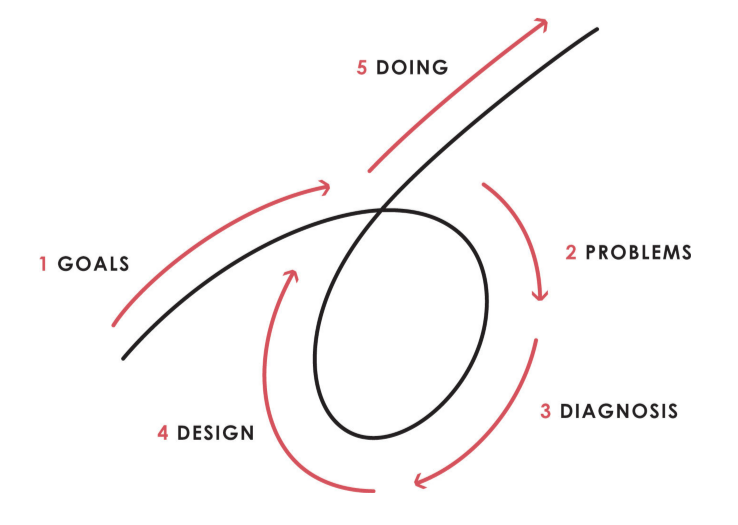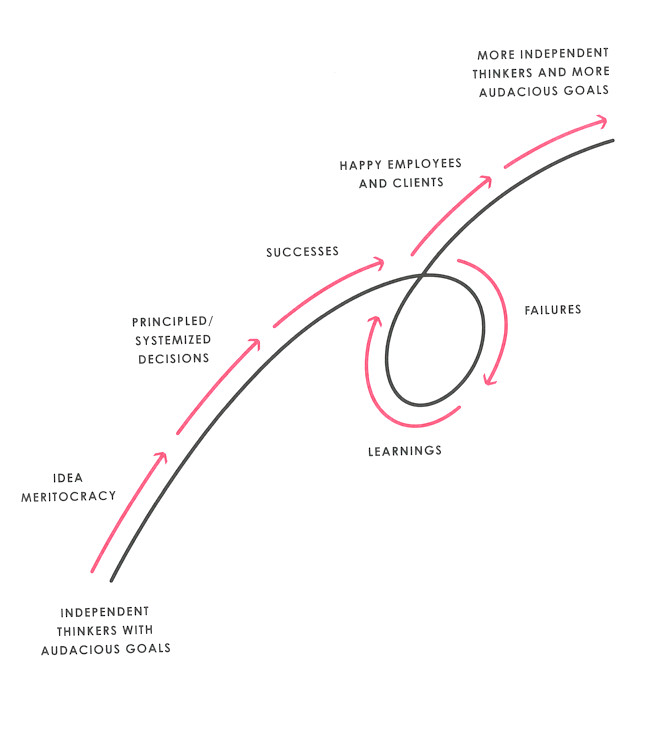2017 - Principles
Leadership
Ray Dalio
Summary
- Develop your principles and systemize your decision making.
- Life Principles: “Dreams + Reality + Determination = A Successful Life.”
- Work Principles: “Idea Meritocracy = Radical Truth + Radical Transparency + Believability-Weighted Decision Making.”
- Management Principles: “manage like the conductor of an orchestra.”
- And some investment tips from Ray Dalio.
- More quotes from the book
Principles are the fundamental truths that determine how you behave and reflect your inner character and values.
Develop your principles and systemize your decision making.
It’s up to you to decide what you want to get out of life and what you want to give. Start with what you want, your real goals, and then work back to what you need to attain them.
Sound principles are effective ways of dealing with reality. Think through your principles for making decisions, write them out in both words and computer algorithms, backtest them if possible, and use them upon a real-time basis to run in parallel with your brains’ decision making.
Consistently improve your principles through trial and error. Making mistakes, figuring out what you did wrong, coming up with new principles, and finally succeeding.

Image: principles.com
Life Principles: “Dreams + Reality + Determination = A Successful Life.”
Have clear, audacious goals. Don’t confuse goals with desires, and never rule out a goal because you think it’s unattainable. Be audacious - great expectations create excellent capabilities. Knowing how to deal well with your setbacks is as essential as knowing how to move forward.
Evaluate the reality. Identify and do not tolerate the problems that stand in the way of achieving those goals. Accurately diagnose the problems to get at their root causes. Design plans that will get you around them. Do what’s necessary to push these designs through to results.
To make effective decisions, avoid harmful emotions, take time to synthesize the situation, and be evidence-based when making decisions. Understand the concept of “by-and-large” and use approximations. Avoid spending too much time on little differences at the margins at the expense of the important things.
Own your outcome. Don’t blame bad outcomes on anyone but yourself. Whatever circumstances life brings you, you will be more likely to succeed and find happiness if you take responsibility for making your decisions well instead of complaining about things beyond your control.
Pain + reflection = progress. Identifying, accepting, and learning how to deal with your weaknesses, preferring that the people around you be honest with you rather than keep their negative thoughts about you to themself and being yourself rather than having to pretend to be strong where you are weak. Adaptation through rapid trial and error is invaluable.
Be radically open-minded and Radical Transparent. They are invaluable for rapid learning and effective change as they will help eliminate the source of misunderstanding. It’s initially awkward, but the more you do it, the more comfortable you will be with it.
Successful people can go above themselves to see things objectively and manage those things to shape change. And because it’s difficult to see oneself objectively, you need to rely on others’ input and the whole body of evidence.

Image: principles.com
Work Principles: “Idea Meritocracy = Radical Truth + Radical Transparency + Believability-Weighted Decision Making.”
To have an idea meritocracy, (1) put your honest thoughts on the table, (2) bring together smart, independent thinkers to have productively, thoughtful disagreements to come up with the best possible collective thinking, and (3) resolve their disagreements in an agreed-upon way such as believability-weighting.
Have integrity and demand it from others. Never say anything about someone that you wouldn’t say to them directly and don’t try people without accusing them of their faces. Don’t let loyalty to people stand in the way of truth and the well-being of the organization.
Be extremely open. Create an environment where everyone has the right to understand what makes sense, and no one has the right to hold a critical opinion without speaking up. Share things that are hardest to share, but deny transparency to the people who don’t handle it well and don’t share sensitive information with the enemies.
Create a culture in which it’s okay to make mistakes and unacceptable not to learn from them. Recognize that mistakes are a natural part of the evolutionary process, and observe the patterns of mistakes to see if they are products of weaknesses and reflect when you experience pain. However, you must know what types of mistakes are acceptable and what types are unacceptable.
Who is more important than What. The most important decision for you to make is who you choose as your responsible parties who bear the consequences. When putting someone in a position of responsibility, make sure their incentives are aligned with their responsibilities, and they experience the consequences of the outcomes they produce.
Find the most believable people possible who disagree with you and try to understand their reasoning. Believable opinions are most likely to come from people who have accomplished the thing in question three times and who have great explanations of the cause-effect relationships that lead them to their conclusion. Choose your believable people wisely and assess their believability by systematically capturing people’s track records over time. Eventually, the believability-weighted decision-making is a way of supplementing and challenging responsible parties’ decisions, not overriding them.
Conflicts are essential for great relationships. They are how people determine whether their principles are aligned and resolve their differences. Spend lavishly on the time and energy you devote to getting in sync because it’s the best investment you can make. Remember that you have a responsibility to be reasonable and considerate when advocating for your point of view and should never let your “lower-level you” gain control, even if the other person loses his or her temper.
Hire right, because the penalties for hiring wrong are huge. Look at the people who are willing to look at themselves objectively and pay attention to people’s track records. Hire people you want to share your life with. And always train, test, evaluate, and sort people.
Bad times, coupled with good reflections, provide some of the best lessons.
Management Principles: “manage like the conductor of an orchestra.”
You should gain a rich enough understanding of the people, processes, problems around you to make well-informed decisions. Then you need to know your people exceptionally well, provide and receive regular feedback, and have quality discussions. Use periodic updates as a tool for staying on top of what your people are doing and thinking.
Know what your people are like and what makes them tick. Regularly take the temperature of each person who is important to you and the organization. Learn how much confidence to have in your people and vary your involvement based on your confidence.
Don’t worry about whether or not your people like you. Just worry about making the best decisions possible, recognizing that most everyone will think you are doing something - or many things - wrong no matter what you do. The important thing is for you to be logical and objective in assessing your probabilities of being right. It’s not illogical or arrogant to believe that you know better than the average person, so long as you are appropriately open-minded.
Don’t give orders and try to be followed; try to be understood and understand others by getting in sync. The greatest influence you can have over intelligent people and the greatest influence they will have on you comes from continually getting in sync about what is true and what is best to all want the same things.
Hold yourself and your people accountable and appreciate them for holding you accountable. Holding people accountable means understanding them and their circumstances well enough to assess whether they can and should do some things differently, getting in sync with them about that and if they can’t adequately do what is required, removing them from their jobs. Distinguish between a failure in which someone broke their contract and failure in which there was no contract, to begin with. And watch out for people who confuse goals and tasks, because if they can’t make that distinction, you can’t trust them with responsibilities.
To be principled means to consistently operate with principles that can be clearly explained.
And some investment tips from Ray Dalio.
“One of the keys to being a successful investor is only to take bets you are highly confident in and to diversify them well.”
“Proper diversification is the key to reducing the risks without reducing returns. Making a handful of good uncorrelated bets that are balanced and leveraged well is the surest way to having a lot of upside without being exposed to the unacceptable downside.”
“When everybody thinks the same thing, it’s almost certainly reflected in the price, and betting on it is probably going to be a mistake.”
“Most people are more emotional than logical; they tend to overreact to short term results; they give up and sell low when times are bad and buy too high when times are good. Wise people stick with sound fundamentals through the ups and downs.”
More quotes from the book
“Successful people change in ways that allow them to continue to take advantage of their strengths while compensating for their weaknesses and unsuccessful people don’t.”
“Maturity is the ability to reject good alternatives to pursue even better ones.”
“There is almost always a good path that you just haven’t figured out yet, so look for it until you find it rather than settle for the choice that is then apparent to you.”
“To me, the greatest success you can have as the person in charge is to orchestrate others to do things well without you. A step below that is doing things well yourself, and worst of all, is doing things poorly yourself.”
“Recognize emotional barriers most people have when looking at their problems and weaknesses forthrightly. Rather than embracing ambiguous situations and difficult challenges, they tend to get uncomfortable when facing them.”
“Instead of feeling frustrated or overwhelmed, I saw pain as nature’s reminder that there is something important for me to learn.”
“Asking others who are strong in areas where you are weak to help you is a great skill that you should develop no matter what, as it will help you develop guardrails that will prevent you from doing what you shouldn’t be doing.”
“A manager’s ability to recognize when outcomes are inconsistent with goals and then modify designs and assemble people to rectify them makes all the difference in the world. The more often and more effectively a manager does this, the steeper the upward trajectory.”